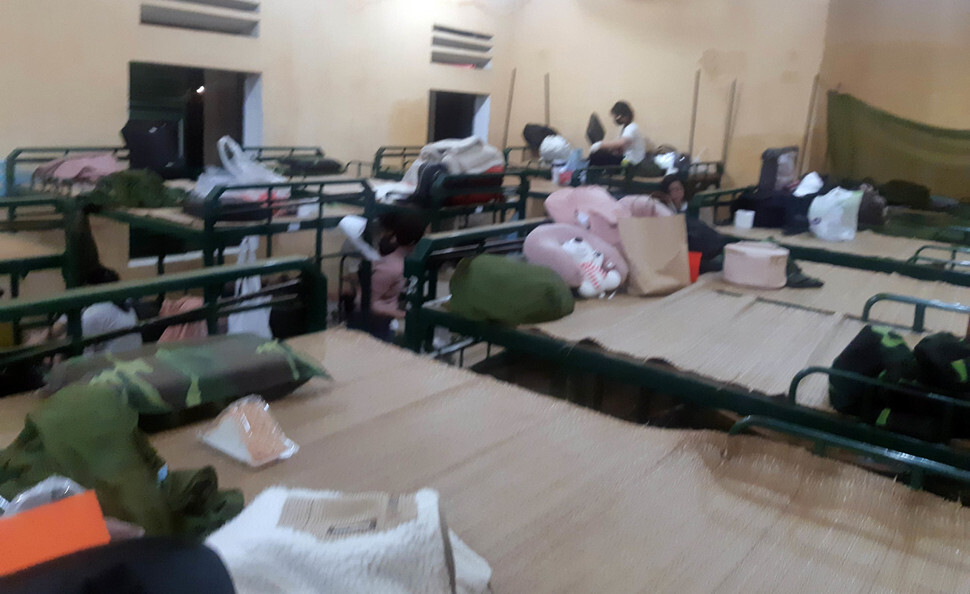hankyoreh
Links to other country sites 다른 나라 사이트 링크
US issues “do not travel” advisory for Daegu

The US has issued a “do not travel” advisory for the South Korean city of Daegu. The total number of regions implementing outright entry bans or quarantining and other intensified immigration procedures on travelers arriving from South Korea has risen to 81.
On Feb. 29, the US State Department issued a “do not travel” advisory for the city of Daegu in connection with the novel coronavirus outbreak. US citizens are being recommended not to visit Daegu. The travel recommendation for South Korea as a whole remains at Level 3 (“reconsider travel”), with only Daegu subject to a Level 4 advisory, which represents the highest level. The State Department measure was taken shortly after a second emergency press conference that day by US President Donald Trump in connection with COVID-19 (the disease resulting from the novel coronavirus), following an earlier one on Feb. 26.
No travel restrictions have been imposed for traveling to the US from South Korea. But the possibility of US restrictions on South Korean arrivals cannot be ruled out as the COVID-19 outbreak intensifies. During a press conference at the White House that day, Vice President Mike Pence said, “The President has also directed the State Department to work with our allies in Italy and in South Korea to coordinate a screening -- a medical screening in their countries of any individuals that are coming into the United States of America.”
Since Feb. 28, Korean Air and Asiana Airlines have been checking the temperatures of all passengers prior to boarding US-bound flights and refusing to board anyone with a temperature of 37.5 degrees or higher.
In a Mar. 1 telephone conversation with US Deputy Secretary of State Stephen Biegun, South Korean Minister of Foreign Affairs Kang Kyung-wha detailed the South Korean government’s proactive screening and disease prevention measures, and strongly requested the US “refrain from excessive measures that could needlessly curtail exchange between our two countries,” the Ministry of Foreign Affairs (MOFA) said.
Amid a continued increase in the number of South Korean COVID-19 diagnoses, the number of countries and territories with bans or other restrictions on arrivals from South Korea had risen to 81 as of Mar. 1.
S. Koreans quarantined upon arrival in Hanoi, VietnamThirty-seven countries and territories are either fully prohibiting or temporarily blocking arrivals from South Korea, with Angola, Vietnam, and Kyrgyzstan added to the list over the weekend. After previously suspending visa-free entry for South Koreans, Vietnam prohibited the landing of a South Korean passenger aircraft in Hanoi on Feb. 29. Only after the measure was taken did Vietnamese authorities notify the relevant airlines by telephone, and Asiana Airlines Flight OZ729 to Hanoi changed course to return to Incheon International Airport 40 minutes after takeoff that morning. MOFA announced that it had summoned the Vietnamese Ambassador to South Korea on Mar. 1 to sternly protest the measure, adding that it was working in various ways to have the measure overturned, including a meeting between the South Korean Ambassador to Vietnam and the local deputy minister of health.
Turkey also moved on Feb. 29 to suspend all passenger aircraft traffic to and from South Korea. Over 220 passengers were on standby at the airport on Mar. 1 after the cancellation of a Turkish Airlines flight scheduled to leave Istanbul for Incheon that morning. A MOFA official said, “Consular officials at the local embassy are working to alter their tickets to allow them to return by way of a third country.”
Forty-four countries and territories, including China, had introduced intensified immigration procedures, including stronger quarantining and temporary isolation measures. Nigeria had been added to the list since the day before. A total of 11 provinces and cities in China have intensified entry procedures for South Korean travelers, including the provinces of Guangdong, Liaoning, Shandong, Shaanxi, Sichuan, and Jiangsu and the cities of Shanghai and Tianjin.
By Park Min-hee and Lee Jung-ae, staff reporters, Hwang Joon-bum, Washington correspondent, and Cho Ki-weon, Tokyo correspondent
Please direct comments or questions to [english@hani.co.kr]

Editorial・opinion
![[Column] The state is back — but is it in business? [Column] The state is back — but is it in business?](https://flexible.img.hani.co.kr/flexible/normal/500/300/imgdb/original/2024/0506/8217149564092725.jpg) [Column] The state is back — but is it in business?
[Column] The state is back — but is it in business?![[Column] Life on our Trisolaris [Column] Life on our Trisolaris](https://flexible.img.hani.co.kr/flexible/normal/500/300/imgdb/original/2024/0505/4817148682278544.jpg) [Column] Life on our Trisolaris
[Column] Life on our Trisolaris- [Editorial] Penalties for airing allegations against Korea’s first lady endanger free press
- [Editorial] Yoon must halt procurement of SM-3 interceptor missiles
- [Guest essay] Maybe Korea’s rapid population decline is an opportunity, not a crisis
- [Column] Can Yoon steer diplomacy with Russia, China back on track?
- [Column] Season 2 of special prosecutor probe may be coming to Korea soon
- [Column] Park Geun-hye déjà vu in Yoon Suk-yeol
- [Editorial] New weight of N. Korea’s nuclear threats makes dialogue all the more urgent
- [Guest essay] The real reason Korea’s new right wants to dub Rhee a founding father
Most viewed articles
- 1[Column] Why Korea’s hard right is fated to lose
- 260% of young Koreans see no need to have kids after marriage
- 3Amid US-China clash, Korea must remember its failures in the 19th century, advises scholar
- 4[Column] The state is back — but is it in business?
- 5Japan says it’s not pressuring Naver to sell Line, but Korean insiders say otherwise
- 6AI is catching up with humans at a ‘shocking’ rate
- 7S. Korean chaebols comprise 84% of GDP but only 10% of jobs
- 8Hybe-Ador dispute shines light on pervasive issues behind K-pop’s tidy facade
- 9[Column] Life on our Trisolaris
- 10[Reportage] New funeral culture taking hold in South Korea